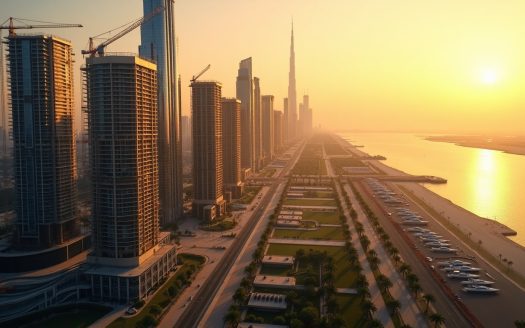The Ultimate Guide to Real Estate Jobs in Dubai
Dubai’s real estate sector is one of the most vibrant markets worldwide and creates many career opportunities for professionals. The property market keeps growing and professionals just need qualified expertise in all types of specializations. Both newcomers and experienced professionals can find attractive prospects to advance their careers in this thriving sector.
Success in Dubai’s real estate industry depends on specific qualifications, licenses, and skills. The market has roles that fit different expertise levels, from real estate agent positions to property management. This piece gets into everything you need to know about requirements, career paths, and opportunities to build a successful career in Dubai’s real estate sector.
Overview of Dubai’s Real Estate Market
Dubai’s real estate market shows impressive growth and resilience as residential values grew by 4.8% in Q2 2023. This marks the tenth straight quarter of price increases. The market’s strong performance creates excellent opportunities for real estate jobs in Dubai, especially in luxury and commercial sectors.
Current market trends
Recent performance metrics reveal a thriving market. Dubai’s property sales soared to AED 49.6 billion in July 2024. This represents a remarkable 31.63% jump from the previous year. The real estate sector demonstrated strong momentum through the first half of 2024. Developers closed more than 43,000 property deals worth AED 122.9 billion. These numbers showcase a robust 30% growth compared to last year. The market saw apartment prices climb to AED 1,290 per square foot, a 4.8% increase. Villa prices followed a similar upward trend and reached AED 1,520 per square foot.
Key players and developers
Several prominent developers shape Dubai’s real estate scene and propel breakthroughs and development. The major players include:
- Emaar Properties: Led by Mohammed Ali al-Abbar, Emaar stands as the largest construction and development company in the UAE that created iconic projects like Burj Dubai
- Nakheel: A government-owned entity behind Palm Jumeirah and other landmark developments
- Dubai Holding: A major investment holding company Sheik Mohammed bin Rashid Al Maktoum created
- DAMAC Properties: The largest private sector developer in the UAE manages a portfolio worth over USD 18 billion
These developers create numerous opportunities for real estate agents and specialists across Dubai’s thriving sector.
Impact of Expo 2020 on the real estate sector
Expo 2020 has transformed Dubai’s real estate world in remarkable ways. The event led to huge infrastructure investments that included new roads, public transport links, and a bigger Al Maktoum International Airport . Property values continue to grow steadily after the Expo, especially in the areas near the Expo site in Dubai South .
Dubai South, Downtown Dubai, and Business Bay now see more buyers and renters because of better connections and worldwide exposure . The commercial property market has grown impressively. Average prices now reach AED 1.6 million – a jump of 36.7% compared to last year .
The future looks promising for the real estate market. Developers plan to deliver about 41,000 new units in 2025 and 42,000 in 2026. These numbers show an 80% increase from the expected 27,000 units in 2024. Real estate professionals will find many opportunities in development, sales, and property management as the market expands.
Types of Real Estate Jobs in Dubai
Dubai’s real estate sector has countless professional opportunities that need different skills and expertise. Career paths range from entry-level jobs to senior management positions. Ambitious professionals can find rewarding roles that match their talents and aspirations in this dynamic industry.
Real estate agents and brokers
Real estate agents are the foundations of Dubai’s property market and serve as a vital link between property sellers and buyers. A simple salary between AED 2,000 to AED 5,000 awaits entry-level agents, while experienced professionals can earn AED 12,000 to AED 15,000 per month. Their main duties include:
- Conducting property viewings and consultations
- Preparing and executing transaction documents
- Managing client databases in CRM systems
- Analyzing market trends and competition
- Taking part in marketing events and advertising campaigns
Property managers
Dubai’s property managers play a vital role in residential and commercial property operations. Their responsibilities include protecting property values and building strong relationships with tenants. These professionals ensure smooth facility operations daily. Mid-level positions offer salaries between AED 8,000 to AED 10,000, with career paths ranging from Assistant Property Manager to Senior Manager roles.
Real estate developers
Dubai’s iconic skyline owes much to its real estate developers. These visionaries transform architectural concepts into reality and collaborate with partners to create landmark developments. Their core duties encompass:
- Business leadership that drives property portfolio success
- Brand service strategy execution
- Building strong bonds with partners and stakeholders
- Oversight of new development launches
- Creating market expansion roadmaps for growth
Facilities management professionals
Dubai’s real estate sector now depends heavily on facilities management. These professionals combine technical expertise with management skills to keep properties running smoothly. New managers typically earn AED 8,000, while experienced facilities managers can make up to AED 15,000 each month. Their daily work involves:
- Running building operations and maintenance
- Taking care of service contracts and vendor relationships
- Following safety regulations
- Leading maintenance teams and contractors
- Setting up maintenance programs that prevent issues
Dubai’s real estate market keeps growing and changing. New job roles appear as the market gets more mature. People who do well in these jobs mix their technical know-how with people skills and market understanding. Many jobs come with performance bonuses, and some roles offer commission structures that can boost earnings by a lot.
Qualifications and Skills Required
Dubai’s real estate industry’s success just needs a mix of formal education, professional certifications and soft skills. Real estate professionals who want jobs in Dubai must build their credibility and prove they can work in this competitive market.
Educational requirements
Dubai’s entry-level real estate positions do not require mandatory education, but qualifications can give you an edge in the market. A degree in finance, real estate management, or marketing builds a strong foundation for future professionals. Business Administration degrees add significant value by giving you the complete knowledge of business principles, management strategies, and financial analysis.
Licensing and certifications
Dubai requires all real estate professionals to obtain RERA certification. The core team must complete these certification requirements:
- RERA Training Course: A four-day “Certified Training for Real Estate Brokers” program costs around AED 3,000
- RERA Examination: Professionals need a minimum score of 70% to qualify and receive their broker’s card
These certifications provide great value:
- CIPS Certification: The National Association of Realtors awards this to international property specialists
- CFA Certification: Real estate investment professionals benefit from this qualification
- CFM Certification: Facility management professionals need this certification
Essential soft skills
Dubai’s successful real estate professionals demonstrate these ten significant qualities:
- Communication Excellence: The ability to clearly explain property details and negotiate deals
- Attention to Detail: A sharp eye for handling transactions and paperwork
- Negotiation Prowess: Knowing how to close the best deals while staying professional
- Organizational Capability: The skill to handle multiple tasks and meet deadlines
- Customer Service Focus: A genuine commitment to deliver exceptional client experiences
- Self-Motivation: The inner drive to excel in competitive markets
- Adaptability: Quick response to market shifts and changes
- Integrity: A strong foundation in ethical business practices
- Technical Proficiency: Expert use of digital marketing tools
- Continuous Learning: Active pursuit of professional growth
Language proficiency
Language skills play a vital role in Dubai’s multicultural real estate environment. Real estate professionals need to master:
- English: Essential for international communications
- Arabic: Valuable for local market operations
- Hindi/Urdu: Beneficial for South Asian client interactions
- Russian: Advantageous for dealing with Eastern European investors
Real estate professionals who speak multiple languages can direct cross-cultural communications better and build trust with clients from different backgrounds. These language capabilities, paired with cultural awareness, boost an agent’s success rate in Dubai’s international property market.
How to Start Your Real Estate Career in Dubai
A career in Dubai’s real estate sector demands strategic planning and compliance with regulatory requirements. Professionals must guide themselves through essential steps. The competitive market requires dedication to establish a strong presence in this dynamic field.
Getting permits and licenses
A real estate career in UAE starts with proper documentation. Real estate agents need a UAE residency visa, which their employing agency usually sponsors. The licensing process has a mandatory four-day “Certified Training for Real Estate Brokers” course at the Dubai Real Estate Institute (DREI). This course costs AED 3,000.
After completing the training, agents must:
- Pass the RERA exam with a minimum score of 70%
- Get a Police Clearance Certificate
- Submit the license application through their agency’s Trakheesi portal
- Get their Broker Registration Number (BRN)
Agents need to renew their broker’s license yearly. They must score 85% on renewal examinations to continue their practice.
Joining a reputable real estate agency
Dubai has several long-standing real estate agencies that help accelerate your career growth. Here are some prominent agencies in the market:
- fäm Properties – Delivers live market insights
- haus & haus – Winner of ‘Real Estate Agency of the Year 2020’
- Allsopp & Allsopp – ISO-certified agency
- CORE Real Estate – Specialists in commercial properties
Professionals should review these key aspects before choosing an agency:
- Training and development programs
- Commission structures
- Market reputation
- Technology infrastructure
- Support systems for new agents
Building a professional network
A strong professional network plays a significant part in your real estate career success in Dubai. The city has active networking groups that connect real estate professionals:
- Dubai Real Estate Networking Group (DRENG)
- Real Estate Investors Meetup
- Dubai Landlords Meetup
- Networking Behomes Real Estate
- Properties in Italy Group
These groups are a great way to get industry insights, share experiences, and discover new business opportunities with fellow professionals.
Developing a personal brand
Dubai’s competitive real estate market, especially in the luxury segment, demands strong personal branding. Here’s what makes personal branding work:
- Define Core Values: Build unique selling propositions that set you apart from competitors
- Content Strategy: Tell your success stories and share market insights through blogs and social media
- Visual Identity: Get professional photos done and keep your branding consistent
- Online Presence: Stay active on all major platforms
- Community Engagement: Talk to your audience and join industry discussions
Real estate professionals should showcase their expertise by:
- Writing complete realtor profiles
- Keeping their message consistent across channels
- Being approachable
- Making compelling video content
- Making the most of social media
Modern tools shape your personal brand. Platforms like BayutPro, Brokepad, and Profolio™ let agents verify property listings and build trust. Professional growth comes through platforms like Bayut Academy that improve market knowledge and understanding.
Success in Dubai’s real estate needs you to learn and adapt. The market changes fast. You must know the latest trends, build strong client relationships, and keep improving your skills to stay ahead of the competition.
Challenges and Opportunities in Dubai’s Real Estate Sector
Dubai’s real estate sector offers abundant opportunities, but professionals must overcome challenges to build successful careers in the ever-evolving market. A recent study shows that 84% of real estate professionals expect fiercer competition ahead. This trend emphasizes the importance of strategic career planning and continuous professional growth.
Market competition
Dubai’s real estate sector’s competitive scene continues to evolve dynamically. Property Monitor data reveals residential property transactions jumped 47% from the previous year and reached 15,046 transactions. This remarkable performance has drawn the attention of many professionals who have entered the sector and created a vibrant competitive environment.
The market competition shows these distinct characteristics:
- International investment makes up 60% of residential real estate investments
- EMEA investors contribute 32% of total investments
- Non-EMEA investors hold 27% of the market
Regulatory changes
Dubai’s regulatory framework has seen the most important changes that ensure market stability and protect stakeholders. The Dubai Land Department (DLD) and Real Estate Regulatory Authority (RERA) have made several crucial updates to the system.
Recent Regulatory Developments:
- Limitation of property listings to three brokers per property
- Improved verification requirements for property advertisements
- Stricter compliance measures for real estate transactions
- Implementation of trust accounts for development projects
These new rules want to make the sector more professional and create a transparent market environment. Both professionals and investors will benefit from these changes.
Technological advancements
Technology integration has changed Dubai’s real estate sector and created new opportunities and challenges for professionals. The digital world has transformed dramatically through:
PropTech Integration:
- IoT-powered workplace management systems
- Predictive analytics for market analysis
- Asset digitalization platforms
- Virtual and augmented reality property tours
Smart buildings have become common features in the landscape. These buildings now include:
- Automated lighting and climate control systems
- IoT sensors for immediate monitoring
- Energy-efficient smart devices
- Voice-activated controls
Emerging niche markets
Several specialized market segments have emerged in Dubai’s real estate sector, creating new opportunities for professionals. These trends shape the market:
Sustainable Development: Developers now emphasize eco-friendly properties by including:
- Solar power integration
- Green building materials
- Water conservation systems
- Landscaped green spaces 27
Mixed-Use Developments: These projects have become increasingly popular and offer:
- Integrated residential and commercial spaces
- Enhanced lifestyle amenities
- Improved work-life balance
- Strong investment potential
Branded residences have become a profitable niche in the luxury segment. A recent case study revealed an investor earned a 110% profit through resale in The Opus residential complex after just 10 months.
Market Performance Indicators:
- Luxury properties yield annual returns of 3-5%
- Business-class properties generate 8-10% returns
- Studio apartments achieving up to 10% annual rental returns
Advanced data analytics and artificial intelligence have transformed the sector. Property owners and managers now use:
- Predictive maintenance systems
- Energy consumption optimization tools
- Immediate monitoring platforms
- Automated workflow management systems
Real estate professionals must update their technical skills and market knowledge regularly. Blockchain technology and digital property management platforms have optimized processes and created new opportunities for tech-savvy professionals.
Buyer demographics show interesting shifts as more first-time property buyers enter the market. This trend became more evident after the pandemic, with 55% of real estate experts noting an increase in starter home purchases.
Different property types have shown remarkable growth:
- Detached homes, townhouses, and villas: 57% increase
- Apartments and flats: 58% increase
Dubai’s real estate professionals can find diverse opportunities in the market. Success depends on adapting to technological changes, understanding regulatory requirements, and spotting opportunities in specialized market segments.
Conclusion
Dubai’s real estate sector continues to be a resilient market with exceptional growth potential. Price increases and transaction volumes show its consistent strength. Career paths range from traditional brokerage roles to new positions in PropTech and green development. Major developers, regulatory frameworks, and technological advances have altered the map of this fast-paced market.
A successful real estate career in Dubai requires deep commitment to professional growth and market adaptability. Real estate professionals must blend formal qualifications like RERA certification with key soft skills and tech expertise. Long-term success comes to those who learn continuously, build strong networks, and track market trends actively in this thriving sector.
FAQs
What are the benefits of working in real estate in Dubai?
Working in real estate in Dubai can be highly lucrative due to the strong demand for properties. Real estate agents in Dubai can earn an average monthly income of approximately AED 29,000, which is considerably higher than in many other countries.
Can non-citizens work as real estate agents in Dubai?
Yes, foreigners can work as real estate agents in Dubai. However, they must meet certain requirements, including being at least 21 years old and holding a valid residency visa. Non-UAE or GCC citizens will need to secure a residency permit to qualify for a real estate license.
What requirements must be met to work in real estate in Dubai?
To work as a real estate agent in Dubai, you need a residency visa, completion of a RERA-approved training program, passing the RERA exam, and obtaining a real estate agent license.
Is it challenging to succeed as a realtor in Dubai?
Yes, succeeding as a realtor in Dubai can be challenging due to the competitive nature of the market. Agents must work diligently, maintain regular engagement with clients, and understand their needs. Employment structures vary, with some firms offering a commission-only model, while others provide a base salary plus commission.





